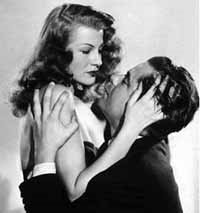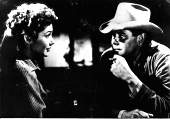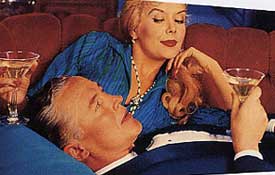"All those things I can do, all those powers, and I couldn't even save him."
Glenn Ford passed away yesterday at age 90. Another of Hollywood's greatest generation lost. (Who's left? Not many. The “over 90” list is now reduced to a handful: Kirk Douglas, Richard Widmark, Olivia de Havilland, Karl Malden, Harry Morgan. The wonderful June Allyson, who died just last month, missed her 90th by only a few months.)
Our generation is most likely to remember Ford as Jonathan Kent in Superman — a great bit of casting. Even though he was only on screen for about 3 minutes, his influence on the young Clark Kent permeates the whole movie, as do his words You are here for a reason.
 Film historians are going to remember Ford first and foremost for his role opposite Rita Hayworth in Gilda — a solid perfomance, although the film is so thoroughly dominated by the seductive Hayworth that the other roles might as well have been played by hat racks.
Film historians are going to remember Ford first and foremost for his role opposite Rita Hayworth in Gilda — a solid perfomance, although the film is so thoroughly dominated by the seductive Hayworth that the other roles might as well have been played by hat racks.Ford was particularly good in edgy films like The Blackboard Jungle and The Big Heat — in both films he plays reasonable men whose vulnerabilities are exposed and attacked, driving him into both despair and cold brutality.
For me, the highlight of Ford's career is the underappreciated Delmore Daves/Elmore Leonard Western-drama 3:10 to Yuma. (A totally unnecessary remake of this great film is apparently scheduled for release next year. Sigh.) It's a small, claustrophobic film very much in the mold of High Noon, although Ford's “villain” Ben Wade steals the film with a twinkle in his eye and an unhurried, smug charm. It's one of those performances that makes you realize how underused Ford was in many of his other roles.
For instance, in one early scene, Wade and his men ride into the seemingly empty town of Bisbee, having just robbed the Contention stage. They stop in the town's quiet saloon, where they find Emmy (the beautiful Felicia Farr, a.k.a. Mrs. Jack Lemmon) alone behind the bar. The men line up as Emmy moves silently down the bar, filling their glasses one by one, until she reaches Wade at the end:
Wade: “Marshal around?”
Emmy: “He's in the office.”
Wade: “Well, you tell him the coach from Contention was held up. We passed it on the way in. They don't have any horses.”
[Emmy continues pouring drinks.]
Wade: “Did you hear what I said?”
Emmy: “Yeah, I heard.”
Wade: “Well, why don't you go tell him?”
Emmy: “The marshal takes his nap between one and two.”
Wade: “Oh he does? Well, that's nice. That way he don't get tired.”
Emmy: “You fellas come from the north? Down here everybody naps between one and two.”
Wade: “Everybody except you.”
Emmy: “The boss is napping now. I take my nap between two and three.”
Wade: “Well, I guess we come too early.”
And then later, when he's alone with Emmy (he should be riding out of town with his men, but after realizing he once knew Emmy in another town, he can't resist returning to the bar to see her):
 Wade: “You ever sing anymore?”
Wade: “You ever sing anymore?”Emmy: “Who's there to sing for in Bisbee?”
Wade: “You know, you look kind of skinny.”
Emmy: “I feel skinny.”
Wade: “That's all right, I don't mind a skinny girl, just so she has blue eyes to make up for it. You got blue eyes?”
Emmy: “Brown.”
Wade: “That's all right, they don't have to be blue.”
Of course, Wade dallies too long with the alluring Emmy, and the law catches up with him. But even as the marshal loads him onto the stage (to catch the titular train to prison), he smiles at Emmy in a way that lets her know she was worth it.





0 Comments:
Post a Comment
<< Home